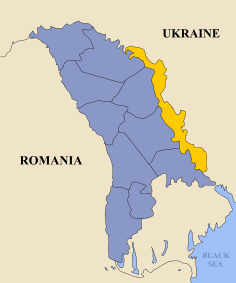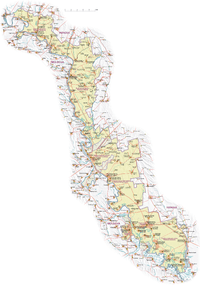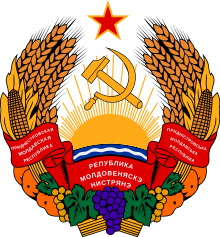Transnistria
Transnistria (also called "Trans-Dniestr" or "Transdniestria") is a breakaway territory located mostly on a strip of land between the Dniester River and the eastern Moldovan border to Ukraine. Since its declaration of independence in 1990, and especially after the War of Transnistria in 1992, it is governed as the Pridnestrovian Moldavian Republic (PMR, also known as "Pridnestrovie"), a state with limited recognition which claims the territory to the east of the river Dniester, the city of Bender and its surrounding localities located on the west bank. The Republic of Moldova does not recognize the secession and considers the territories controlled by the PMR to be part of Moldova's autonomous region of Stînga Nistrului ("Left Bank of the Dniester").[2][3][4]
| Pridnestrovian Moldavian Republic Република Молдовеняскэ Нистрянэ Invalid language code. Republica Moldovenească Nistreană Приднестро́вская Молда́вская Респу́блика Invalid language code. Pridnestróvskaya Moldávskaya Respúblika Придністровська Молдавська Республіка Invalid language code. Prydnistrovs'ka Moldavs'ka Respublika |
||||||
|---|---|---|---|---|---|---|
|
||||||
| Orin-ìyìn orílẹ̀-èdè: Мы славим тебя, Приднестровье (Russian)
My slavu pojem Pridněstrovju (transcription) |
||||||
 Ibùdó Transnistria |
||||||
| Olúìlú (àti ìlú títóbijùlọ) | Tiraspol 46°50′N 29°37′E | |||||
| Èdè àlòṣiṣẹ́ | Russian1, Moldovan2 (Cyrillic), Ukrainian |
|||||
| Àwọn ẹ̀yà ènìyàn (2005) | 32.1% Moldovans 30.4% Russians 28.8% Ukrainians 2.5% Bulgarians 6.2% others and unspecified |
|||||
| Ìjọba | Presidential republic | |||||
| - | President | Yevgeny Shevchuk | ||||
| - | Prime Minister | Pyotr Stepanov | ||||
| Aṣòfin | Supreme Council | |||||
| Autonomous territory of the Republic of Moldova, de facto independent | ||||||
| - | Declaration of Independence | 2 September 1990 | ||||
| - | War of Transnistria | 2 March - 21 July 1992 | ||||
| - | Recognition | by 3 non-UN members only3 | ||||
| Ààlà | ||||||
| - | Àpapọ̀ iye ààlà | 4,163 km2 1,607 sq mi |
||||
| - | Omi (%) | 2.35 | ||||
| Alábùgbé | ||||||
| - | Ìdíye 2010 | 518,700[1] | ||||
| - | 2004 census | 555,347 | ||||
| - | Ìṣúpọ̀ olùgbé | 124.6/km2 345/sq mi |
||||
| Owóníná | Transnistrian ruble4 (PRB) |
|||||
| Àkókò ilẹ̀àmùrè | EET (UTC+2) | |||||
| - | Summer (DST) | EEST (UTC+3) | ||||
| Àmìọ̀rọ̀ Internet | none5 | |||||
| Àmìọ̀rọ̀o tẹlifóònù | +373 spec. +373 5 and +373 2 | |||||
| 1 | Russian is the main official language and the lingua franca. | |||||
| 2 | Linguistically the same as Romanian. | |||||
| 3 | Limited to breakaway Abkhazia and South Ossetia, see Community for Democracy and Rights of Nations. | |||||
| 4 | Moldovan leu used in the localities under Moldovan control and in the security zone. | |||||
| 5 | .ru and .md sometimes used. | |||||

Itokasi
- "Население Приднестровья за полгода сократилось на 3,5 тыс. человек," Novy region 2, 2010-09-07. NR2.ru
- CIA World factbook Moldova. territorial unit: Stinga Nistrului (Transnistria)
- Herd, Graeme P.; Jennifer D. P. Moroney (2003). Security Dynamics in the Former Soviet Bloc. Routledge. ISBN 0-415-29732-X.
- Zielonka, Jan (2001). Democratic Consolidation in Eastern Europe. Oxford University Press. ISBN 0-19-924409-X.
.svg.png)
